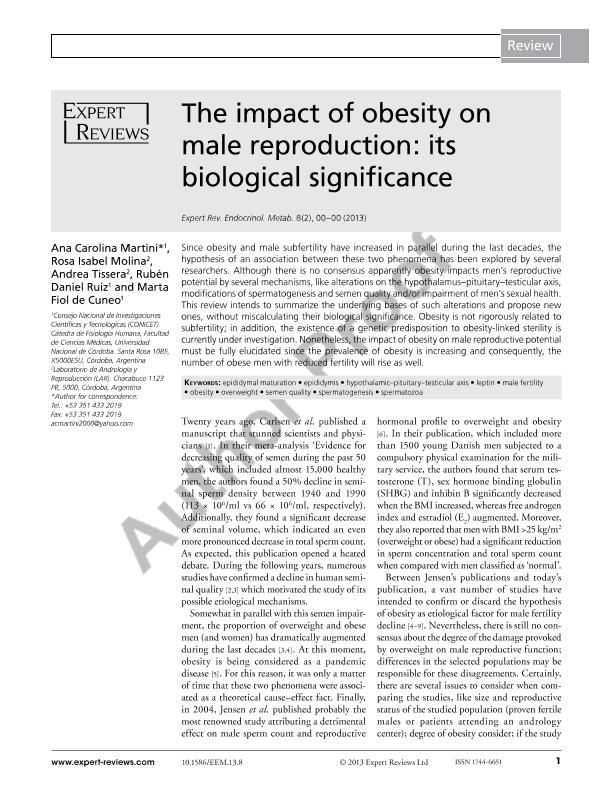Artículo
The impact of obesity on male reproduction: its biological significance
Martini, Ana Carolina ; Molina, Rosa Isabel; Tissera, Andrea; Ruiz, Ruben Daniel
; Molina, Rosa Isabel; Tissera, Andrea; Ruiz, Ruben Daniel ; Fiol de Cuneo, Marta
; Fiol de Cuneo, Marta
 ; Molina, Rosa Isabel; Tissera, Andrea; Ruiz, Ruben Daniel
; Molina, Rosa Isabel; Tissera, Andrea; Ruiz, Ruben Daniel ; Fiol de Cuneo, Marta
; Fiol de Cuneo, Marta
Fecha de publicación:
03/2013
Editorial:
Taylor & Francis
Revista:
Expert Reviews in Endocrinology and Metabolism
ISSN:
1744-6651
e-ISSN:
1744-8417
Idioma:
Inglés
Tipo de recurso:
Artículo publicado
Clasificación temática:
Resumen
Since obesity and male subfertility have increased in parallel during the last decades, the hypothesis of an association between these two phenomena has been explored by several researchers. Although there is no consensus apparently obesity impacts men’s reproductive potential by several mechanisms, like alterations on the hypothalamus–pituitary–testicular axis, modifications of spermatogenesis and semen quality and/or impairment of men’s sexual health. This review intends to summarize the underlying bases of such alterations and propose new ones, without miscalculating their biological significance. Obesity is not rigorously related to subfertility; in addition, the existence of a genetic predisposition to obesity-linked sterility is currently under investigation. Nonetheless, the impact of obesity on male reproductive potential must be fully elucidated since the prevalence of obesity is increasing and consequently, the number of obese men with reduced fertility will also rise.
Archivos asociados
Licencia
Identificadores
Colecciones
Articulos(INICSA)
Articulos de INSTITUTO DE INVESTIGACIONES EN CIENCIAS DE LA SALUD
Articulos de INSTITUTO DE INVESTIGACIONES EN CIENCIAS DE LA SALUD
Citación
Martini, Ana Carolina; Molina, Rosa Isabel; Tissera, Andrea; Ruiz, Ruben Daniel; Fiol de Cuneo, Marta; The impact of obesity on male reproduction: its biological significance; Taylor & Francis; Expert Reviews in Endocrinology and Metabolism; 8; 2; 3-2013; 139-148
Compartir
Altmétricas



